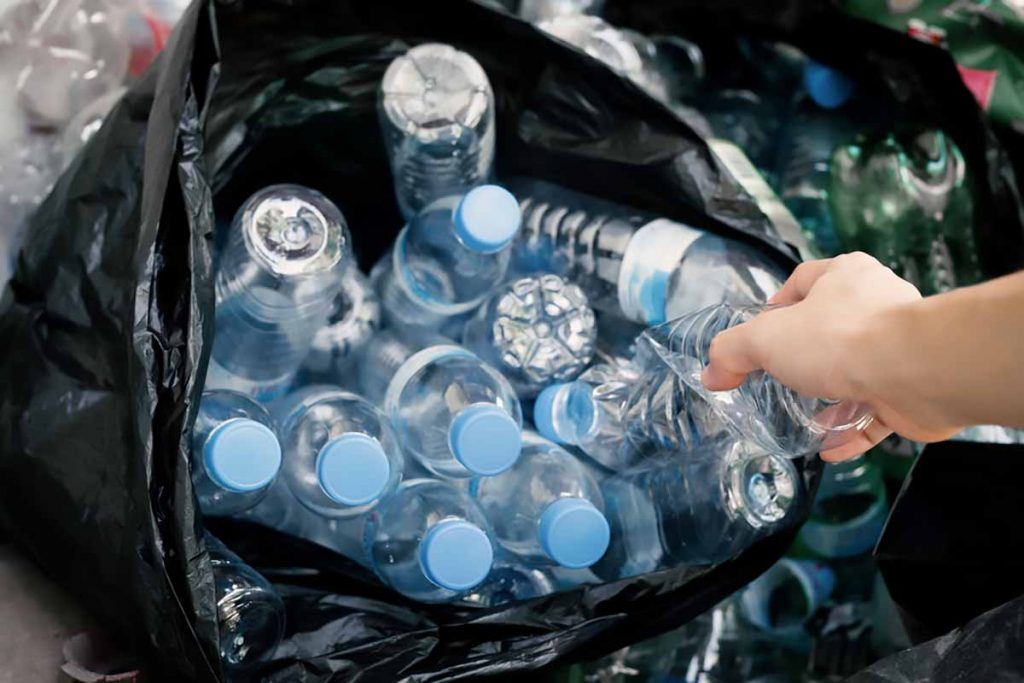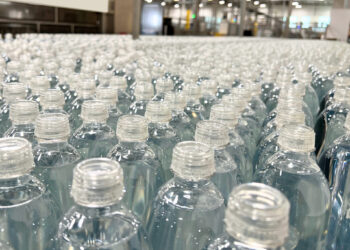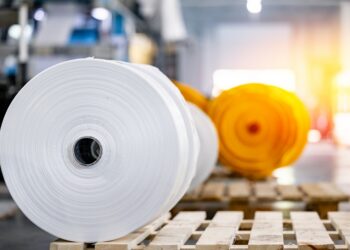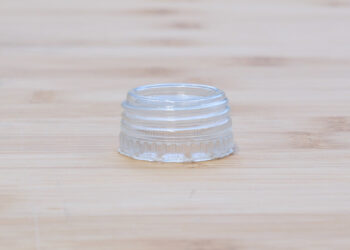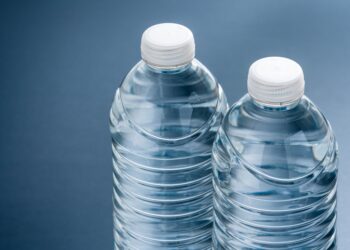Merlin Plastics, Natura PCR, Circulus, Far Eastern New Century and other prominent plastics reclaimers have received FDA letters allowing them to recycle post-consumer plastics into food and drink packaging.
During the latter half of 2022, the U.S. Food and Drug Administration (FDA) awarded 15 letters of no objection (LNOs) to 14 companies seeking to use their technologies to produce recycled resin for food and drink packaging. The letters cover the recycling of PET, LDPE, LLDPE, PP and PLA.
In issuing the letters, the FDA was convinced the recycling processes would result in contaminant concentrations of 0.5 parts per billion or less in the food, below its “threshold of regulatory concern.”
Plastics Recycling Update publishes a roundup of LNOs twice a year. The last roundup, which was published in September 2022, covered letters issued through the first half of 2022. The federal database of all FDA LNOs is available here.
The following are summaries of LNOs issued during the second half of 2022, starting with the most recent letters (unless otherwise noted, all technologies involved are mechanical recycling processes):
On Dec. 23, the FDA issued a letter to Merlin Plastics Supply covering the recycling of PP into all types of food and drink packaging. The feedstock is limited to PP scrap that was previously used in food-contact applications. The letter allows the resulting post-consumer resin (PCR) to be exposed to a wide range of temperatures. At the low end, the PCR could be used in packages that hold frozen or refrigerated meals that are reheated in the container. At the high end, the plastic could be exposed to boiling water.
On Dec. 16, Da Fon Environmental Technology Company received an LNO to recycle PP into packaging for dry, solid foods with surfaces that do not contain free fats or oils. The letter allows the PCR to be exposed to temperatures as low as frozen (with no reheating in the container) and as high as room temperature.
Natura PCR on Dec. 15 received an LNO to recycle LLDPE into packaging for a variety of different food types. The PCR could be exposed to temperatures as low as frozen (with no reheating in the container) and as high as room temperature.
The company, which specializes in recycling film, issued a press release about the LNO in January. The release noted that the FDA letter green-lights the recycling of Natura PCR’s products into 100% recycled-content packaging.
“This is a pivotal step toward making a real impact on meeting sustainable packaging goals of our customers,” Jon Stephens, CEO of Natura PCR, stated in the press release. “The FDA’s LNO broadens the range of applications for our PCR products. We can now create a true cyclical value chain where plastic food packaging materials can be used where primarily virgin materials were utilized previously.”
Natura PCR was formerly a brand of recycling company Avangard Innovative. Last fall, Waste Management, which is the largest garbage and recycling company in North America, purchased a controlling interest in Avangard’s U.S. plastic recycling business, which is based in Waller, Texas. WM renamed the business Natura PCR, which continues to operate as an independent company.
In February, WM disclosed that it plans to spend about $125 million to expand Natura PCR’s production capabilities.
The FDA on Dec. 13 gave Circulus Holdings an LNO to recycle LDPE into packages for raw fruits, vegetables and shell eggs. The PCR could be exposed to temperatures as low as frozen (with no reheating in the container) and as high as room temperature.
A relatively new company with aggressive growth plans, Houston-based Circulus issued a press release about the letter in January. The release noted that the letter allows Circulus’ Riverbank, Calif. facility to produce PCR for 100% recycled-content food packaging.
“From its inception, Circulus has been committed to the goal of producing resin for consumer-facing products and packaging,” David Hudson, founder and chief strategy officer for Circulus, stated in a press release. “This development provides important and independent validation that we have achieved our goal, allowing us to move forward in this important market for recycled materials.”
One of Circulus’ customers is California-based flexible packaging producer Emerald Packaging, which previously told Plastics Recycling Update that it signed an offtake agreement with Circulus for 1 million pounds of PCR a year but delivery had been delayed because it took a year and a half to go through FDA’s approval process.
On Nov. 29, Dalmia Polypro Industries received two similar LNOs, both covering the recycling of PET into packaging for all types of food and drink. Both letters allow the PCR to be exposed to a range of temperatures. On the low end, the packaging can be frozen, although no reheating of food in the container is allowed. On the upper end, the package can be exposed to temperatures above 150 degrees Fahrenheit.
On Nov. 23, Veolia Huafei Polymer Technology Company received an LNO to recycle PET into packaging for all food types. The letter allows the packaging to be used at the following temperatures: At the low end, it can be used for frozen or refrigerated ready-prepared meals that are reheated in the container. At the high end, the package can be exposed to temperatures above 150 degrees Fahrenheit.
Shanghai Re-Poly Environmental Protection Technology Company on Nov. 16 received a letter to recycle PP scrap derived from food containers into packaging for raw fruits, vegetables and shell eggs. The letter allows the package to be exposed to a range of temperatures, frozen (with no reheating in the container) at the low end up to room temperature at the high end.
On Sept. 8, Uflex was issued a letter to recycle PET into packaging for all types of food and drink. This letter allows the PCR to be exposed to a relatively wide range of temperatures. At the low end, the package could hold ready-prepared food that is stored at frozen or refrigerated temperatures and is reheated in the package. At the high end, the package could be exposed to temperatures above 150 degrees Fahrenheit.
On Sept. 6, the FDA awarded an LNO to PureCycle Technologies. The letter allows the company to recycle PP into packaging for all types of food and drink, as long as the scrap feedstock comes from PP drink cups. The letter allows the PCR to be exposed to temperatures as low as frozen (with no reheating in the container) and as high as room temperature.
The FDA on Aug. 12 issued an LNO to Total Corbion PLA. This letter covers the use of a chemical recycling process for polylactic acid (PLA). The resulting recycled resin could be used at level up to 25% in packaging for all types of food. The letter allows the package to be exposed to a range of temperatures. At the low end, it could be used for frozen or refrigerated ready-prepared meals that are reheated in the package. At the high end, the plastic could be exposed to boiling water.
On Aug. 10, Guolong Recyclable Resources Development Company received a letter to recycle PET into packaging for all types of food and drink. The letter covers a wide range of allowed temperatures. At the lower end, it could be used for frozen or refrigerated ready-prepared meals that are reheated in the package. At the upper end, it could be subjected to temperatures over 212 degrees Fahrenheit.
The FDA on July 12 issued a letter to Far Eastern New Century Corporation for the recycling of PET into packaging for all food and drink types. In terms of allowed temperatures, at the low end, the package could be exposed to frozen temperatures, with no reheating in the package allowed. At the upper end, the plastic could be subjected to temperatures above 150 degrees Fahrenheit.
On July 11, the FDA awarded an LNO to PLASgran to recycle PP pots, tubs and trays into new pots, tubs and trays. The articles could be exposed to temperatures as cold as frozen (with no reheating in the package allowed) and as high as room temperature.
Finally, Yung IEE Environmental Technology received an LNO to recycle PET into single-layer clamshells for raw fruits, vegetables and shell eggs. The allowed temperatures range from frozen (no reheating in the packaging allowed) up to room temperature.













